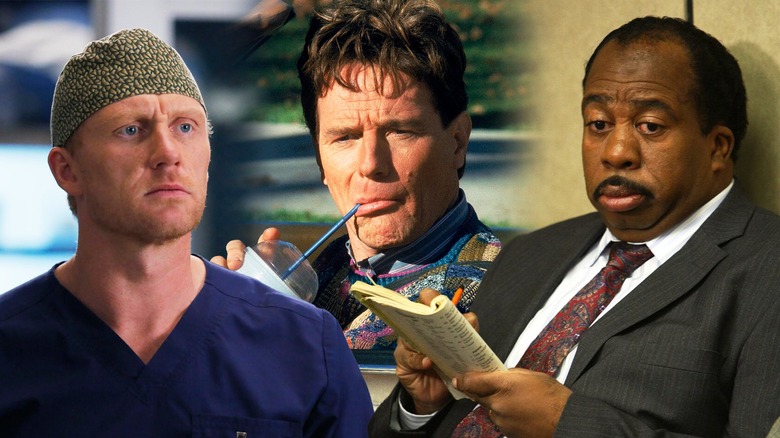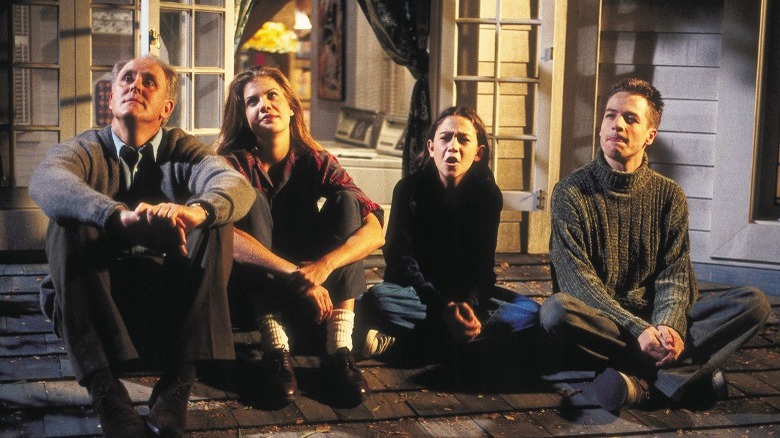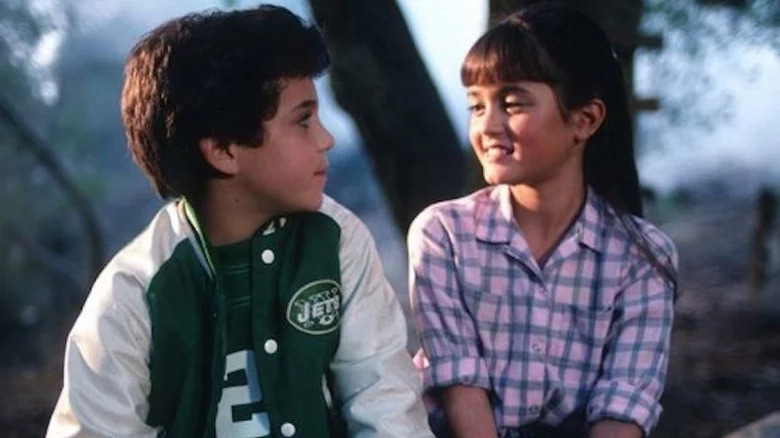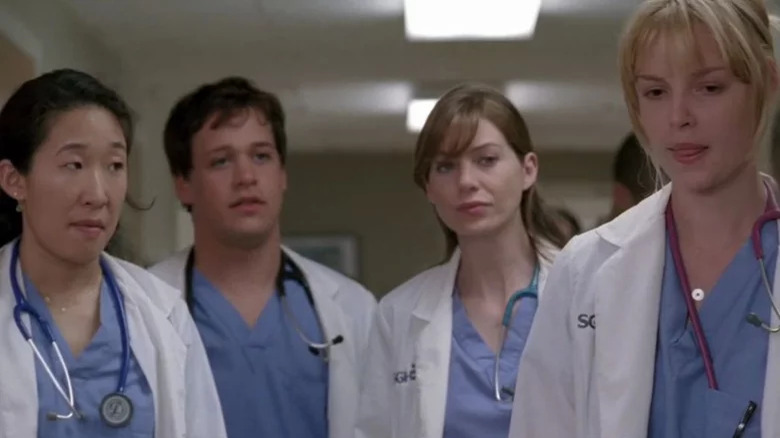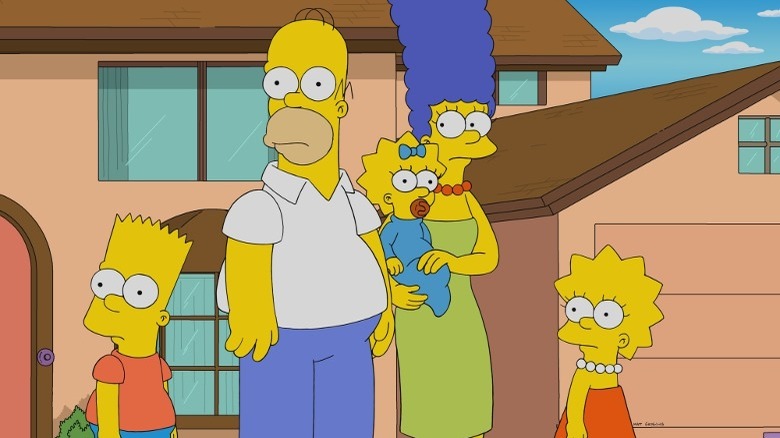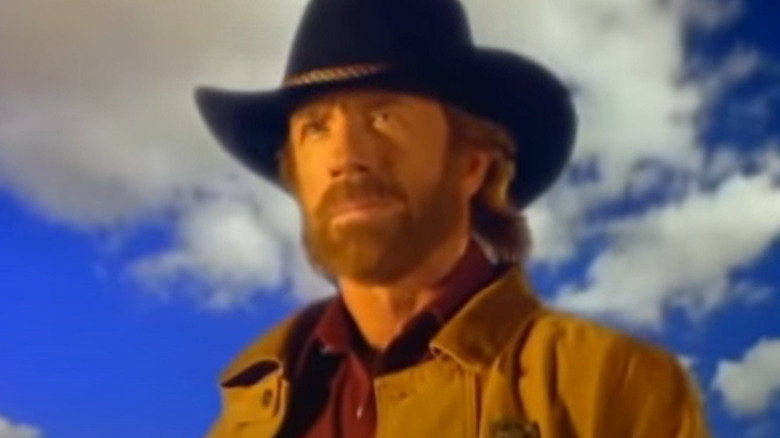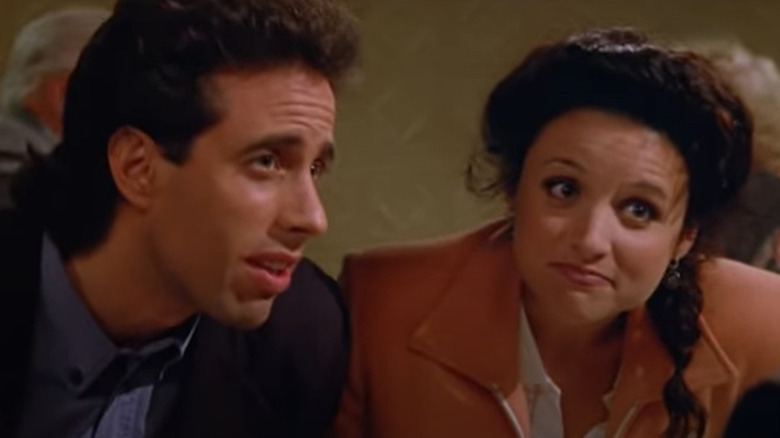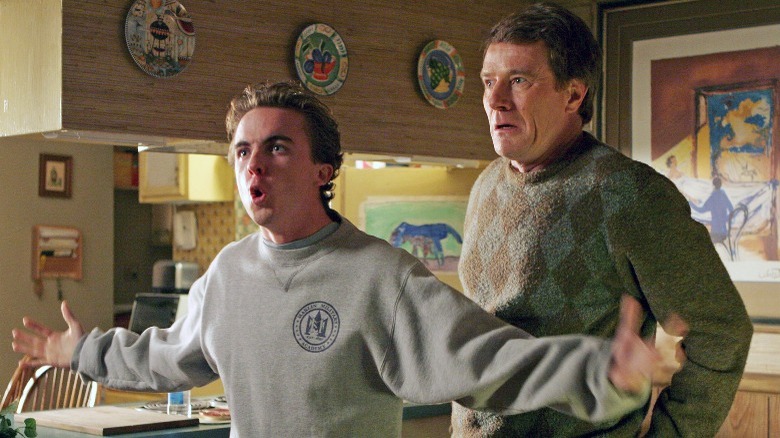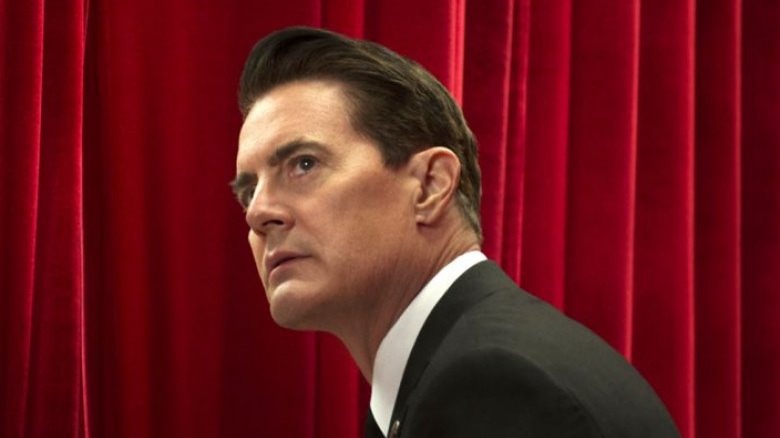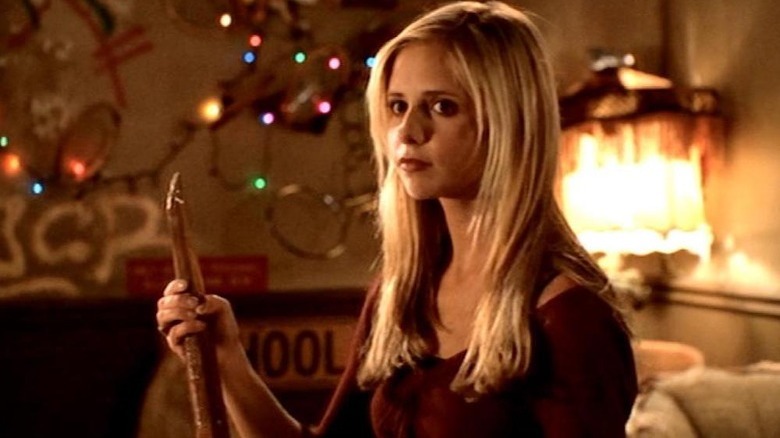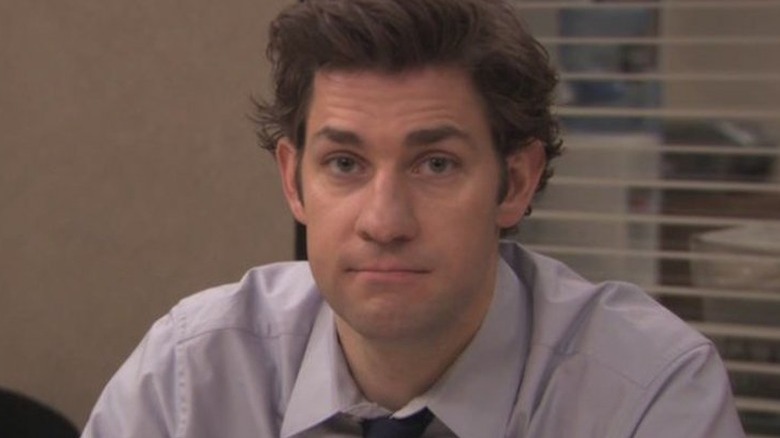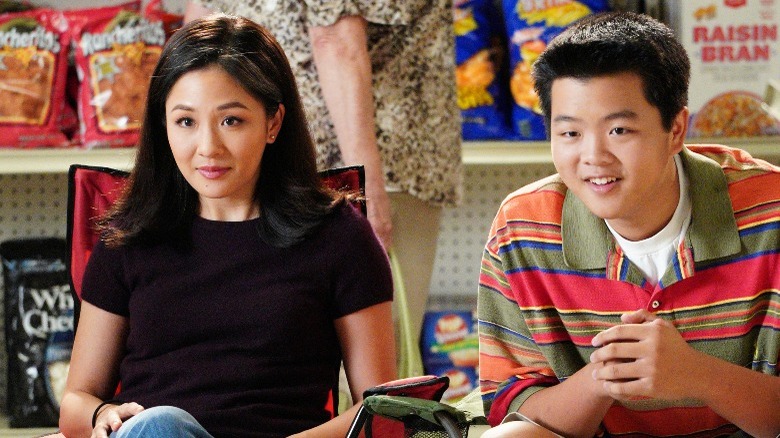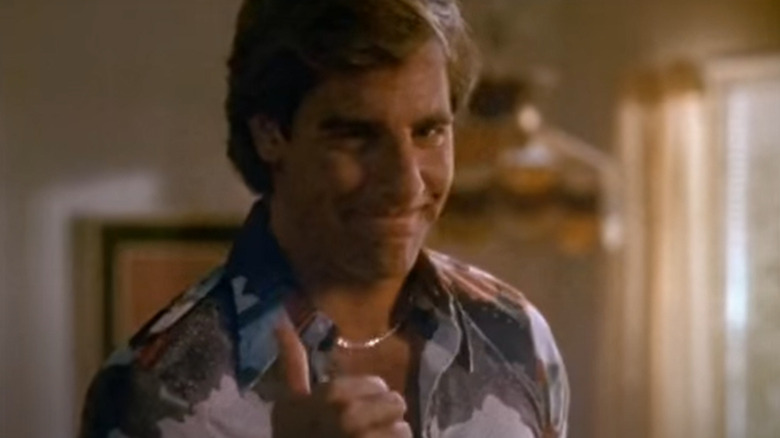Classic Series You Had No Idea Were Mid-Season Replacements
We live in a world where time has collapsed. With the exception of whatever depressing drama happens to be on Sunday nights on HBO, very few things on television feel like "appointment viewing" beyond sporting events and awards ceremonies. And just as the streaming wars have mostly laid waste to waiting for a particular day of the week or time of night for our favorite shows, we've also stopped adjusting our viewing habits around the time of year. The days of breathlessly awaiting the fall schedule announcements for the "big four" broadcast networks — NBC, ABC, CBS, and Fox — aren't entirely over, but the networks don't control the high-profile timeslots the same way they used to.
According to Deadline, a historically low 13 pilots have been ordered for consideration for the big four networks this fall, down from as many as 20 pilots per network in years past. Back then, the "best" pilots — the ones the networks had the most confidence in — would get chosen for the highest profile evening timeslots — typically a primetime slot immediately following a flagship series like "Seinfeld" or "Friends" – each autumn. But if they failed to hold an audience, there were always mid-season replacement shows there to pick up the slack. And despite being "runners-up" during pilot season, plenty of these mid-season cast-offs would go on to be pillars of network programming for years, despite not getting all the fanfare and press associated with a fall premiere. Here are some classic series you had no idea were originally mid-season replacements.
3rd Rock from the Sun
Until we make official first contact with alien life, all of our shows and movies about aliens are really about ourselves, which is what makes aliens posing as humans such a reliable comedic premise. Picking up where classic sitcoms like "My Favorite Martian" and "Mork & Mindy" left off, "3rd Rock from the Sun" premiered in January 1996 and upped the ante from one alien to an entire family. It featured John Lithgow, Kristen Johnston, French Stewart, and Joseph Gordon-Levitt as bumbling, often confused outer space visitors on a mission to study Earth and its inhabitants.
Original "Saturday Night Live" cast member Jane Curtin anchored the main cast as their most consistent human foil, providing a consistently bemused but frustrated counterbalance to Lithgow's histrionic energy and excellent physical comedy. Although often broad and crass, "3rd Rock" mined its premise for surprisingly earnest emotion at times. In an early episode, the "Solomon" family gets the flu and, believing themselves to be dying, declare how much love and respect they have for one another. The show ran for six seasons, never quite matching the first seasons' ratings because NBC changed the timeslot a grand total of 21 times (via Deseret News), leaving us with a surprisingly dark finale in 2001.
The Wonder Years
Premiering immediately after the Super Bowl, "The Wonder Years" got a relatively rare boost for a mid-season replacement show. This prestigious time slot — which often carries over a significant number of viewers from one of the most popular telecasts each year — usually contains an established show with some kind of high-profile gimmick– think Julia Roberts guest starring on "Friends" or a patient with a bomb inside their body on "Grey's Anatomy." In January 1988, perhaps as a bit of counterprogramming, ABC used the opportunity to launch a heartfelt, modest show about coming of age in the suburbs.
Following in the footsteps of other nostalgic TV sitcoms like "Happy Days" and "M*A*S*H," "The Wonder Years" Is set in the late '60s and early '70s. This results in a killer soundtrack, exemplified by Joe Cocker's immortal cover of "With a Little Help from My Friends" in the opening credits of every episode. For its time, "The Wonder Years" was pioneering in expanding the 22-minute sitcom format to include more depth. Its characters had nuance not usually found in the TV suburbs, especially lead actor Fred Savage as the sensitive, awkward main character Kevin Arnold.
Grey's Anatomy
"Grey's Anatomy" premiered in 2005, in the relative TV season dead zone of March. The late-season medical drama, of course, became an instant hit and has gone on to an incredible 19 seasons and counting, with a sprawling cast and even more sprawling timeline. Unlike the high-octane, more procedurally inclined medical drama "ER," "Grey's Anatomy" focuses on the personal lives of its over-worked characters, especially their myriad relationships and rivalries. It was also notable at the time for its diverse cast, and its focus on complex female roles, something that show creator Shonda Rhimes would carry over to later hits like "Scandal" and "Bridgerton."
As of the early 2020s, "Grey's Anatomy" has been on the air several seasons longer than "ER" and will even outlast its titular main character — Meredith Grey actress Ellen Pompeo left "Grey's Anatomy" in Season 19, although it's unclear if there are plans to rename the show to simply "Anatomy." As long as there are attractive surgeons to save lives and fall in love, perhaps it will outlast even the streaming wars themselves.
The Simpsons
"The Simpsons" is not just one of the longest-running TV shows in general — it holds the somewhat technical distinction of being the longest-running scripted primetime show ever. With 34 seasons and well over 700 episodes, it might be surprising to remember that the first full-length episode of "The Simpsons" was actually billed as a Christmas Special. "Simpsons Roasting on an Open Fire" aired on December 17th, 1989. Adapted into sitcom-length from a series of shorts on "The Tracey Ullman Show," "The Simpsons" was actually meant for fall, but an animation snafu led to its winter debut.
Showrunner Al Jean, speaking with SlashFilm, revealed that the episode "Some Enchanted Evening," which was originally intended to be the first episode, "came back wrong" due to the episode's initial director sending bad instructions to the Korean animation studio. This individual could have ended "The Simpsons" before it began; according to Jean, "It could've wrecked everything, but fortunately it didn't." "The Simpsons" snagged "Open Fire," technically the eighth episode produced, as a Christmas-adjacent premiere, and the rest is history.
Walker, Texas Ranger
We wouldn't have Chuck Norris — the man turned meme via the brief but ubiquitous craze for "Chuck Norris Facts" — without "Walker, Texas Ranger." The series stars Norris as Cordell Walker, a Texas ranger in the Dallas-Fort Worth area, which (at least in the show) is home to an endless amount of bank robbers, escaped convicts, gang members, and other cartoonishly evil ne'er-do-wells that exist solely for Walker to beat up. "Walker, Texas Ranger" isn't a good show per se — in fact, it includes some of the most poorly acted scenes in TV history. But its straight-ahead commitment to cheesy one-liners and epic fights have made it a cultural mainstay, ironically or not.
"Walker, Texas Ranger," which premiered with a series of TV-movies late in the "season" in April 1993, was perhaps inspired by Chuck Norris' role as a Texas ranger in the movie "Lone Wolf McQuade." In fact, the team behind "Lone Wolf McQuade" sued CBS and Chuck Norris for $500 million in 1997. The movie's director Steve Carver would later tell The Flashback Files that "MGM and CBS had bigger and better and more lawyers than we did, all the way to the Supreme Court. We failed to convince the Supreme Court that there were similarities." The suit was dismissed, and Walker went on to eight seasons and another TV movie, before being rebooted on The CW as "Walker."
Seinfeld
If the winter mid-season is a built-in handicap for a show's chances at popularity or renewal, then being burned off in the summer is essentially a graveyard where most shows go to die. One of the most popular, acclaimed and enduring sitcoms of all time, "Seinfeld," premiered on NBC as "The Seinfeld Chronicles" on July 5th, 1989. "Premiered" is actually too fancy of a way to put it; the pilot was essentially dumped off without a series order by confused executives who weren't encouraged by poor test audience data.
But as has become legend, late NBC executive Rick Ludwin helped save the show from certain death by rearranging some funds. By canceling a planned Bob Hope comedy special, he secured an order for four more episodes. The following summer, the four new episodes would do well enough to earn a second season, and the show was finally on its way to TV legend status. The "show about nothing" had to survive two trials by fire over the summer to finally make the fall schedule.
Malcolm in the Middle
"Malcolm in the Middle" might be one of the most influential sitcoms that you hear the least about. Premiering mid-season in January 2000, it was made with a frenzied, experimental bravado that brought cinematic flourishes to the relatively stolid, repetitive sitcom format. It was influential in popularizing cold opens that had nothing to do with the plot of the episode, whip-pans as rapid transitions, and was also one of the earliest sitcoms to do away with a laugh track entirely.
Main character Malcolm (Frankie Muniz), a boy genius struggling to fit in, also helpfully speeds up the storytelling by breaking the fourth wall and narrating directly to the audience a year before Ricky Gervais would do the same by way of the "mockumentary" format of "The Office." The show also features dream sequences and stories told in flashback or otherwise out of order, and usually avoids the easy resolutions to its characters' problems associated with the more saccharine family sitcoms of the past. "Malcolm in the Middle" ran for seven seasons, all of them full of the kind of chaotic but warm and human storytelling that would define many of the best sitcoms to follow in the 21st century.
Twin Peaks
There are many reasons why "Twin Peaks" shouldn't have worked. It premiered on ABC late in the season on April 8th, 1990, a Thursday night that put it up against NBC's popular "Must See TV" anchored by the massively popular sitcom "Cheers." "Twin Peaks" was co-created by David Lynch and, with the exception of 1977's "Eraserhead," the series is just as enigmatic and surreal as any of Lynch's films up to that point. When "Twin Peaks" isn't dreamlike or strange, its plot depends on the serialized mystery surrounding the gruesome and deeply upsetting death of a teenage girl.
Even if conventional wisdom said it was too dark for network TV, "Twin Peaks" took hold anyway, changing TV as we know it and charting its own, idiosyncratic path. In the end, especially after the surprise Season 3, "Twin Peaks: The Return," really hit the gas pedal on weirdness in 2017, David Lynch and Mark Frost's vision is arguably more about a journey through the human psyche than the mystery of the story's particulars.
Buffy the Vampire Slayer
Quietly premiering in March 1997, "Buffy the Vampire Slayer" quickly became a cult hit that defined the early days of fledgling network The WB. Like many mid-season success stories, "Buffy" almost didn't happen. The poor reception of the 1992 movie, written by series creator Joss Whedon, didn't inspire confidence, along with the expense of making the show and other factors. But Whedon's vision, which turned the image of the helpless blonde cheerleader victim on its head, overcame the odds and ran for seven seasons.
"Buffy the Vampire Slayer" would set the tone for the internet age to come, with Whedon's trademark mixture of snarky one-liners and gothic horror. At its highest points, it could be heart wrenching and emotional or even experiment with musical and silent episodes. Well before "Twilight" or "True Blood" made vampires sexy, "Buffy the Vampire Slayer" broke new ground in combining the undead with the hormonal angst of high school.
The Office
It's impossible to imagine the U.S. version of "The Office" as anything but the ubiquitous cultural phenomenon that it is now. But long before it was streamed on repeat and quoted endlessly in dating profiles, it was a mid-season remake of the original British show. NBC hedged its bet and aired the first episode on March 24th, 2005. If the short first season floundered, it would join the countless other terrible American remakes of British shows lost to history — no harm, no foul.
As we all know, after an indifferently received first six episodes, "The Office" survived by retooling itself in Season 2 to be more upbeat and write to the individual strengths of its American cast. Rather than imitating the bleak, harsher tone of the British version, it found a sweeter spot that paired the ennui of office life with the surrogate family feeling that workplaces can afford us. In the following years, we fell in love with the more relatable characters of the American "The Office," especially Steve Carell's endlessly quotable Michael Scott. And what started as a mid-season experiment in cultural adaptation became one of the most beloved sitcoms in recent memory.
Fresh Off the Boat
"Fresh Off the Boat" made history when it debuted in the relatively low-profile month of February, 2015.It was the first TV show about an Asian-American family on the air in more than 20 years. Margaret Cho's "All-American Girl" ran for one season in 1994, but it didn't live up to anyone's hopes of making strides for Asian-American representation on network television. Simply by following the lives of Eddie Huang (Hudson Yang) and his family without making them the butt of the joke, "Fresh Off the Boat" was a breath of fresh air.
"Fresh Off the Boat" also raised the profile considerably of Constance Wu ("Crazy Rich Asians") and Randall Park ("Ant-Man and the Wasp"), who play Eddie's parents. The show subverts stereotypes instead of relying on them, and nuanced humor allows issues of race to actually be discussed openly on the show. Like its ABC contemporary "Black-ish," "Fresh Off the Boat" in its six seasons manages to mine plenty of drama and humor from race relations without being about race exclusively.
Quantum Leap
"Quantum Leap," which premiered on March 26th, 1989, is really just a Western with a sci-fi premise that takes the long way around. Much like Clint Eastwood's Man with No Name, or Caine from Kung Fu, Scott Bakula's Sam essentially just wanders from place to place, helping the locals when he can. But instead of a drifter with a troubled past, he's a scientist that turned on Project Quantum Leap before it was ready and is now unstuck in time. Essentially Sam is mid-season replacing people in their own bodies temporarily, until he can accomplish some lingering unfinished business or goal for them and then "leap" away.
Weekly adventures aside, the original "Quantum Leap" succeeded largely because of the chemistry between Bakula's Sam and co-star Dean Stockwell's Al — a colleague who could keep Sam company via holographic projection. Over the course of five seasons and a sprawling, somewhat contradictory timeline, they define the tone of the show with a mixture of banter and philosophical pondering about Sam's predicament. The full name of Bakula's character, Sam Beckett, is an unmistakably reference to playwright Samuel Beckett of "Waiting for Godot" fame. Despite its sci-fi trappings, "Quantum Leap" is a show about the existential ache of the human condition; everywhere Sam goes, he has to help people feel a little less trapped by the circumstances of their own lives.
